Recent Commercial Posts
Ways to Add a Pop of Color without Painting
7/1/2022 (Permalink)
 These are great suggestions if you are thinking about selling your home and want to create a beautifully staged canvas for potential buyers.
These are great suggestions if you are thinking about selling your home and want to create a beautifully staged canvas for potential buyers.
Repainting a room or your entire house is a great way to bring a brand-new look to your home. But it can also be messy and time-consuming to do yourself and expensive if you hire professionals. Also, if you do not like the results, then you have to restart from scratch. Fortunately, there are other ways to add an exciting splash of color to your residence.
Review the following ways to add a pop of color without using one drop of paint. More importantly, you can make these changes for just a fraction of the cost of a professional paint job, and you can change your mind as often as you would like:
- Wall Decorations—just because you are not painting your walls does not mean that they have to be bland. You can add a lot of color by using wall decorations. Find a large, colorful wall painting that takes up a lot of room on an empty wall. Hang a wall tapestry, or even invest in temporary wallpaper to create an accent wall. These alternatives not only add color and pop to your décor but also create an intriguing focal point for the room.
- Furniture Accents—if you are not keen on buying brightly colored furniture, then use furniture accents to add color to your décor. Use a mix of soft tones and vibrant colors to create a unique look. There are a number of accents to mix and match such as afghans, throw pillows, and blankets. Actually, many professionals recommend mixing and matching patterns and colors to create a vibrant color scheme. What is the best part? You can change these furniture accents as the seasons change without the hassle of painting.
- Table Accents—used in combination with furniture accents and wall decorations, table accents and other inspiration pieces can help to create flow. Picture how all the colors will work together. Look for accents such as vases, picture frames, and other trinkets that will add a pop of color without the commitment.
- Floor Decorations—there is little risk and a lot of reward by using floor decorations to add color to your home interiors. If you have a neutral colored couch, adding a bright area rug can play off of your neutral furniture beautifully. Use multiple rugs in addition to the area rug to really jazz up the space and add dimension.
- Window Decorations—your window treatments have a huge impact on the way that your rooms feel. Whether it is how much (or how little) light gets in or how big or small your windows are, getting creative with your window decorations is an excellent way to add color and texture to your home.
- Colorful Furniture—maybe you don't want a bright red couch in your living room, but have you thought about a bright red armchair? Using strategically placed colorful furniture pieces will liven up any room. Even if the rest of your furniture is neutral, these colorful pieces will improve the overall aesthetic of the room. You can achieve this same look with textured and patterned pieces.
- Plants and Flowers—often overlooked inside of the home are fresh plants and flowers that add dimension and liveliness throughout your space. A simple vase of fresh flowers on the kitchen counter or a potted palm in the corner of the living room can make a huge impact on the diversity of color in your home.
These are just a few of the many ways to add pops of colors to your home. What are some of the ways you have avoided painting in the past?
Tips for Winning Negotiations with Your Contractor
6/28/2022 (Permalink)
 For even more ways to save on home improvements and repairs, do not hesitate to contact SERVPRO® of Panthersville at (678) 515-8602 today.
For even more ways to save on home improvements and repairs, do not hesitate to contact SERVPRO® of Panthersville at (678) 515-8602 today.
Big home improvement projects can leave a big hole in your pocket, but you can lower your costs by negotiating the contract price and terms. If you are looking for ways to save money on home improvements, then review the following tips for winning negotiations with Contractors:
- Research—always ensure that you verify Contractors' credentials and experience before you hire them. If you are comfortable working with a Contractor with less experience and less time in the trade, then you may be able to secure a much lower price. Understandably, that there may be quality and timeframe tradeoffs. You can also research the costs of the materials needed for the project for a bargaining chip. A material cost list will help you decide whether or not the Contractor is charging higher prices for the supply portion of the project.
- Shop Around—it's hard to tell whether you are getting a great deal on your home improvement project without having anything to compare prices. Get at least three comparable bids or estimates for the project. Contractors may be willing to lower their cost or negotiate particular terms in the contract if they are competing for the work. Ensure that you provide the Contractor with as many project details as you can and read each estimate thoroughly.
- Buy Your Own Supplies—many Contractors offer to buy the supplies needed for the project and tack the cost onto the estimate or bill you for them later. Contractors often buy supplies from the same supplier, therefore, they may not be getting them at the best price. Save yourself money by offering to buy the supplies yourself to ensure that you are getting the best deals.
- Timing—the cost of your home project will depend somewhat on the season you want the work done. You might be able to save money by seeking estimates during a slow construction season when Contractors will be more willing to negotiate the costs. If you live in a cold climate and you want to add a room to your home, then consider contacting Contractors for an estimate in the winter. The work may be unable to start until warmer weather, but you may be able to lock in their winter rates.
- Approach the Contractor as an Ally—if you approach the pricing as if the Contractor is against you, then you will establish a hostile relationship. Treat Contractors as Allies and they will work with you to find the right price for your budget. Show them respect and ask for changes that may help you save money on the projects. For instance, you may be able to find less expensive countertops or a different type of flooring at a better rate.
Keep these tips in mind the next time you comparison shop for a home Contractor.
Always Stay Safe around Electricity
6/21/2022 (Permalink)
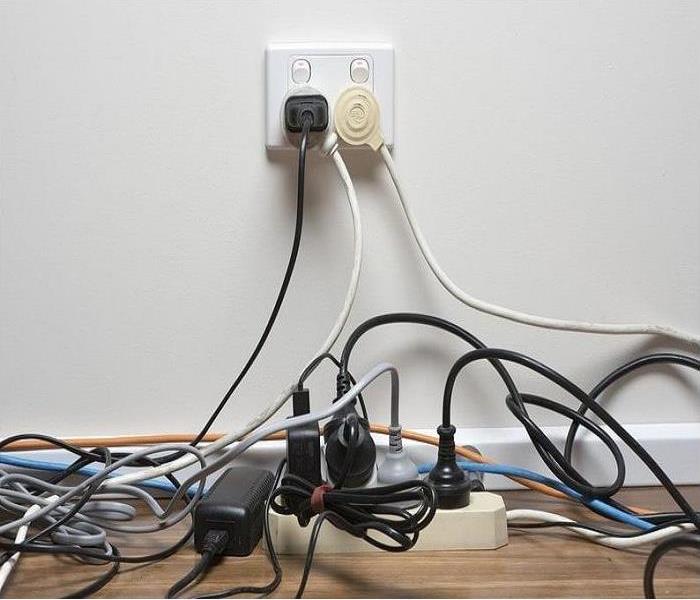 Give your home an electrical safety checkup!
Give your home an electrical safety checkup!
Summer is not only great for backyard barbecues, but it is the perfect time to finish some of those projects around your home that you have postponed all year. As you pull out the power tools and extension cords, chances are you won’t be thinking about the dangers of electricity.
Practice the following safety tips to prevent electrical injuries around your home:
- Never work with electric power tools in wet or damp conditions.
- Always look for nearby power lines before you begin to cut down any trees or trim any branches.
- Ensure that extension cords are in good conditions and that they are not overloaded. They should be used only temporarily, and they should have safety closures to help protect children from electrical shock. Never run extension cords through walls, across doorways, or under rugs or furniture.
- Unplug electrical tools and disconnect spark-plug wires on gasoline powered tools before making adjustments or clearing jams.
- Check for loose fitting plugs that can overheat and lead to fire. Never remove the ground pin to make a three-prong plug fit into a two-conductor outlet, because it could lead to electrical shock. Also, never force a plug into an outlet if it does not fit.
Electric Safety at Home
6/10/2022 (Permalink)
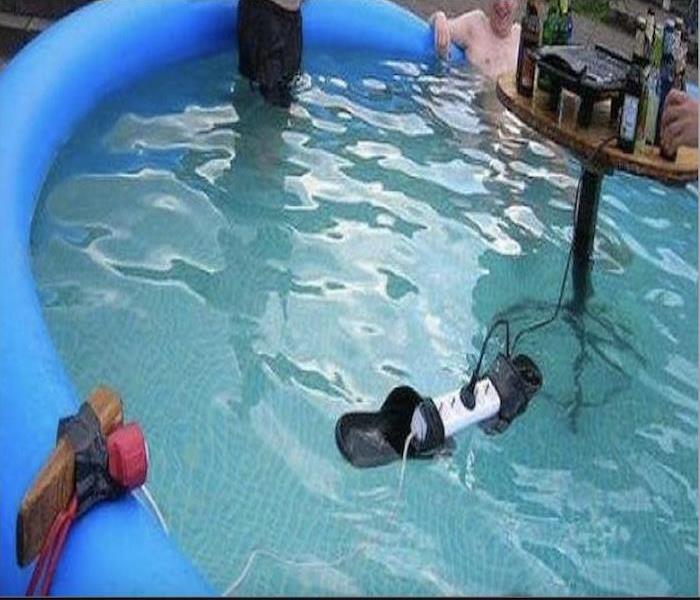 By using a power cord in a moist environment is a serious hazardous defective condition!
By using a power cord in a moist environment is a serious hazardous defective condition!
The importance of electrical safety at home is often taken for granted. Ignoring electrical safety instructions may put your safety and property at risk. Let us all do our part to contribute to a safe and accident-free environment as follows:
- Swimming Pools—do not use electrical appliances near pools; do not route extension cords in the vicinity of pools; do not raise pool maintenance or rescue poles into overhead power lines.
- Outlets—look for outlets that have loose-fitting plugs, exposed wires, or broken plates and have them fixed by a qualified Electrician. Use safety covers on all outlets accessible to children.
- Surge Protectors—only use surge protectors with internal circuit breakers. To prevent overheating, these units will trip the breaker if the power strip is overloaded or shorted to prevent overheating. Do not plug a surge protector into an existing surge protector. Unplug the unit when the surge protector is not in use.
- Cords—do not place appliance cords where they will come into contact with the stove or other heated surfaces. Do not hang appliance cords over countertops where they might be accidentally pulled down.
- Frayed Appliance Cords—worn or frayed appliance cords can cause fire, electric shock, and even electrocution. As a basic home safety procedure, inspect cords regularly to assess wear and replace cords as required.
- Boats—keep boat masts away from power lines.
- Space Heaters—read all manufacturer instructions before use, and keep heaters away from furniture, curtains, sinks, tubs, and water. Do not lay rugs or carpet over the cord. Do not use heater if the cord is frayed or broken, and do not use an extension cord. Turn off heater before leaving home or going to bed.
- Ladders—exercise caution when using ladders, painting, pruning, or cleaning near a service drop where the wiring comes into a house or building at the meter. Weatherproofing on the overhead wiring is not insulation. This covering can become brittle, cracked, and expose you to electrical contact.
- Trees—do not climb trees near power lines. Keep balloons, kites, fishing lines, and aluminum poles away from overhead lines. The lines are uninsulated and you could create a path to the ground by touching them.
- Meter Boxes—ensure safe and easy access to your meter box; do not fence in meter boxes, use private locks on meter boxes, or surround meter boxes with trees and shrubs. Keep dogs safely secured away from your meter box.
- Shoes—avoid damp or wet areas when using electrical power tools outdoors. Wear sturdy, rubber-soled shoes when working with electrical appliances outdoors. NEVER use electrical equipment when barefoot.
- Utility Poles—do not swing, climb, or run into guy wires supporting utility poles. Report damaged guy wires to the power company.
Natural Ways to Stay Healthy
5/20/2022 (Permalink)
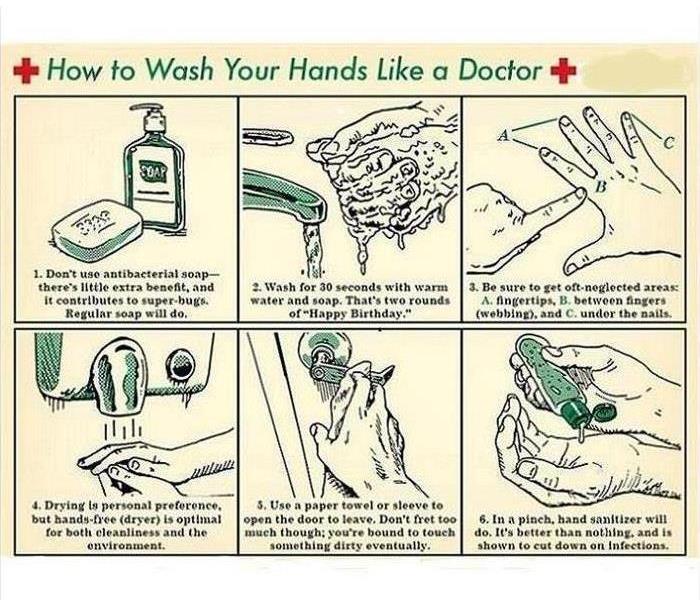 Don't forget to use antibacterial soap and wash your hands for thirty seconds like a Doctor. Hand sanitizers will also help to minimize infections.
Don't forget to use antibacterial soap and wash your hands for thirty seconds like a Doctor. Hand sanitizers will also help to minimize infections.
The cold and flu season can bring unwelcome illness into your household, but you can take some healthy steps ahead of time to be prepared. Along with getting a flu shot, by practicing good habits can lower your risk as sickness spreads through your home or workplace.
- Wash your hands—this is your best defense against the spread of viruses and bacteria. Before eating or after going to the bathroom, take about 30 seconds to work up a good lather and wash your hands thoroughly including your fingernails.
- Keep hand sanitizer nearby—you will need hand sanitizers when you are in a public place and you cannot get to a restroom. Perhaps you have shaken hands with a group of people or used public items, such as pens and shopping carts.
- Stay hydrated—keep drinking plenty of water. Dehydration can leave you vulnerable to illness.
- Eat a healthy diet—a balanced diet that includes fruits and vegetables is a good idea all year, but especially when you are exposed to illnesses. Keep sugar to a minimum; it causes your immune system to work harder. Opt for complex carbohydrates instead.
- Exercise regularly—take time to move around. Even a short walk has important health benefits.
- Get a good night’s sleep—a lack of sleep can make you prone to infection.
Cleanup of Minor Chemical Spills
5/5/2022 (Permalink)
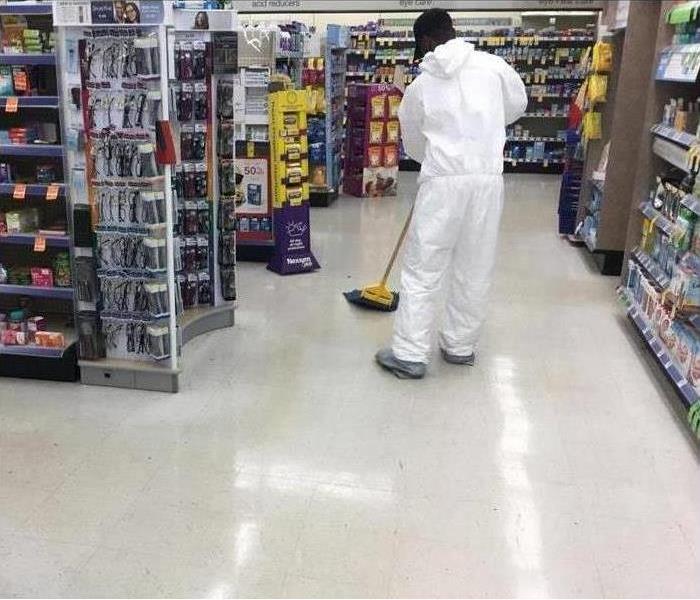 SERVPRO® of Panthersville has the expertise to provide a deeper clean than your basic house cleaning service. Call us at (678) 515-8602.
SERVPRO® of Panthersville has the expertise to provide a deeper clean than your basic house cleaning service. Call us at (678) 515-8602.
Always work carefully and do not hurry when cleaning up minor chemical spills. Keep people away from the spilled chemicals. Do not leave unless someone is there to warn of the danger. If the antimicrobial agent was spilled on anyone, then give correct first aid according to the label instructions.
Use an absorbent material to soak up the spill. You can use soil, sawdust, cat litter, or diatomaceous earth. Shovel all contaminated materials into a leak-proof container for disposal. Dispose of it as you would do with excess antimicrobial agents in accordance with federal, state, and local codes. Do not hose down the area, because it will spread the chemical.
Some spills can be neutralized to stop the chemical action. Read the labeling information to make sure that you use the correct neutralizing chemical or call the manufacturer or distributor of the antimicrobial for assistance.
Do not allow anyone to enter the affected area until the spill is all cleaned up.
Steam Cleaners and High-Pressure Washers
5/5/2022 (Permalink)
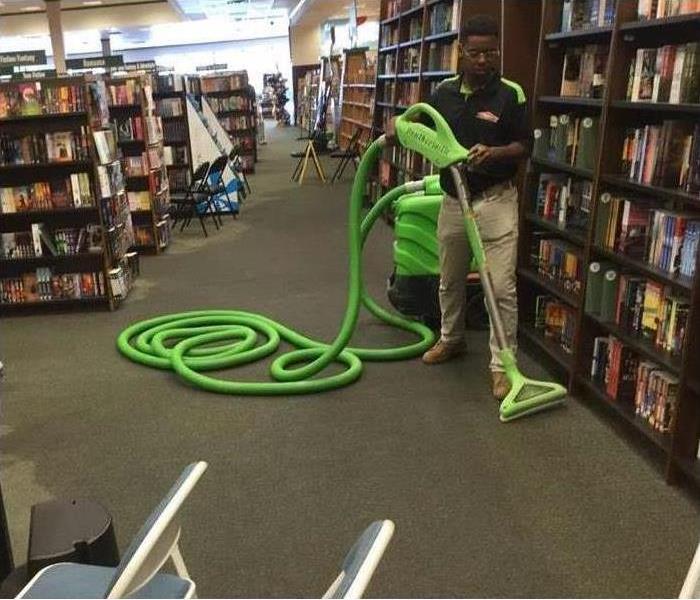 Do not hesitate to contact the trained professionals at SERVPRO® of Panthersville at (678) 515-8602 for your commercial cleaning needs.
Do not hesitate to contact the trained professionals at SERVPRO® of Panthersville at (678) 515-8602 for your commercial cleaning needs.
These machines use the advantage of heat and the force of high-pressure water to effectively dislodge and remove dirt and particulate accumulations on hard surface areas. The proper antimicrobial or disinfecting agent is proportioned into the cleaning steam to effectively reduce the bacteria count on the surfaces.
Advantages:
- Physical force of high pressure stream helps to remove contaminants so that the antimicrobial agent will be more effective.
- Large surfaces and irregular objects may be more easily cleaned and disinfected.
- The strength of the disinfectant solution may be easily varied by adjusting the individual machine’s injection rate.
Limitations:
- These machine are normally bulky and not easily transported.
- Auxiliary power source, such as gas, fuel oil, electricity, and so forth is necessary for machine operation.
- Worker requires training to successfully operate these machines.
The Technician uses a steam cleaner to clean the wet carpet in a library.
 These are great suggestions if you are thinking about selling your home and want to create a beautifully staged canvas for potential buyers.
These are great suggestions if you are thinking about selling your home and want to create a beautifully staged canvas for potential buyers.







 24/7 Emergency Service
24/7 Emergency Service





